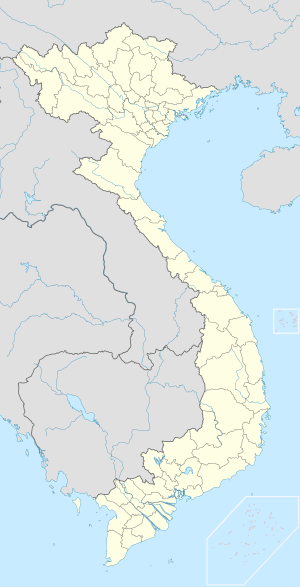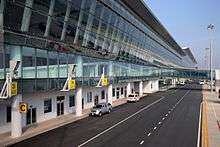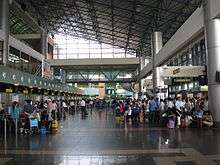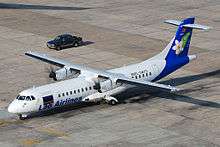Noi Bai International Airport
| Nội Bài International Airport Sân bay Quốc tế Nội Bài | |||||||||||||||
|---|---|---|---|---|---|---|---|---|---|---|---|---|---|---|---|
 | |||||||||||||||
 | |||||||||||||||
| IATA: HAN – ICAO: VVNB | |||||||||||||||
| Summary | |||||||||||||||
| Airport type | Civil/Military | ||||||||||||||
| Owner | Airports Corporation of Vietnam (ACV) | ||||||||||||||
| Operator | Noi Bai International Airport Operation (NIA) | ||||||||||||||
| Serves | Hanoi | ||||||||||||||
| Location | Hanoi, Vietnam | ||||||||||||||
| Hub for | |||||||||||||||
| Elevation AMSL | 39 ft / 12 m | ||||||||||||||
| Coordinates | 21°12′50.4″N 105°48′10.8″E / 21.214000°N 105.803000°ECoordinates: 21°12′50.4″N 105°48′10.8″E / 21.214000°N 105.803000°E | ||||||||||||||
| Website |
noibaiairport | ||||||||||||||
| Map | |||||||||||||||
 HAN Location in Vietnam | |||||||||||||||
| Runways | |||||||||||||||
| |||||||||||||||
| Statistics (2015) | |||||||||||||||
| |||||||||||||||
Nội Bài International Airport (IATA: HAN, ICAO: VVNB) (Vietnamese: Sân bay Quốc tế Nội Bài) in Hanoi, the capital of Vietnam, is the second largest airport in Vietnam in terms of land area and total capacity. It's also the second busiest airport in Vietnam after Tan Son Nhat International Airport. It is the main airport serving Hanoi, replacing the role of Gia Lam Airport. The airport consists of two passenger terminals. Terminal 1 serves domestic flights, and the newly-built Terminal 2 (inaugurated on the 4th of January 2015) serves all international flights to and from Hanoi. The airport is currently the main hub of the country's flag carrier Vietnam Airlines, as well as a major hub of low-cost carriers Vietjet Air and Jetstar Pacific.
The airport is located in Phu Minh Commune in Soc Son District, about 35 kilometres (21 miles) northeast of downtown Hanoi, via the new Nhật Tân Bridge (also inaugurated on the 4th of January 2015).[2] It can also be reached by National Road 3, which connects it with the eastern suburbs of Hanoi. The airport is also close to some satellite cities of Hanoi such as Vinh Yen, Bac Ninh and Thai Nguyen. The airport served a total of 13 million passengers in 2013, despite having a capacity of only 9 million at the time.[1] The new international terminal, which had its first commercial flight on the 25th of December 2014[3] and went into full operation on 31 December 2014, has boosted the total capacity of the airport to 25 million passengers per year.[4][5]
History
The airport was developed immediately south of the Phúc Yên Air Base and opened on 2 January 1978. The terminal 1 building was completed and became operational in 2001.
In 2005 Tiger Airways started thrice-weekly flights between Hanoi and Singapore after launching direct flights between Hồ Chí Minh City and Singapore becoming the first budget airline to operate in Vietnam. It was later joined by low-cost carrier AirAsia when they launched direct flights between Hanoi and Bangkok and Kuala Lumpur.
The second runway (1B – 11R/29L) opened in 2006 and the following year the airport hosted an Airbus A380 for the first time, although no scheduled A380 services are operated from the airport. 2013 saw the first arrival of a Cargolux Boeing 747-8F. In 2014 the airport received its first scheduled service with the newest generation of commercial aircraft when All Nippon Airways started using a Boeing 787-8 on services between to Tokyo–Haneda and later the same year the airport received its first visit of Airbus A350 XWB operated by Airbus on World Tour trip. In 2015, Vietnam Airlines started to operate the Airbus A350 XWB for commercial domestic flights.
The airport has been a SkyTeam hub since mid-2010, after Vietnam Airlines joined the network that year.[6]
Terminals and facilities

At 650 hectares, Noi Bai is the second-largest airport in Vietnam, behind the 800 hectare Tan Son Nhat International Airport. Terminal 1, completed in 2001, had one main section for international flights with a new terminal extension (denoted Lobby E) for domestic flights, which was completed in late 2013. Together with the extension, terminal 1 is capable of handling 9 million passengers per annum.[7] Following the inauguration of Terminal 2 in January 2015, Terminal 1 is solely used for domestic flights. The construction of the new terminal (Terminal 2) next to the existing one with a designed capacity of 10 million passengers per annum started in March 2012. The 996m long new terminal building, funded by a Japan International Cooperation Agency ODA loan was designed by Japan Airport Consultants and was built by Taisei Corporation. The total investment for the project was ¥75.5 billion (US$645.35 million). Japan's official development assistance accounted for ¥59 billion ($504.27 million) of the investment, while the remaining amount was covered by local funds.[8] The new international terminal was inaugurated on the 4th of January 2015[2] together with a new freeway connecting the airport to downtown Hanoi via the Nhật Tân Bridge.
The airport has a 3,800-meter paved runway (CAT II – 11R/29L) which opened in August 2006 and an older 3,200-meter paved runway (CAT I – 11L/29R). The older runway is closed for upgrades for 4 months from August to December 2014. The distance between the two runways is only 250 metres, so the airport currently restricts the maximum passenger capacity in accordance with International Civil Aviation Organisation safety regulations.
Awards
Following the inauguration of the new international terminal, the Noi Bai International Airport received the World's Most Improved Airport Award from Skytrax.[9]
The construction project of the new Noi Bai international terminal also received the JICA President Award for 2015.[10]
Airlines and destinations
Passenger



.jpg)

Notes
1: Kenya Airways's flight from Nairobi to Hanoi continues on to Guangzhou. Kenya Airways, however, does not have fifth freedom rights to transport passengers solely from Hanoi to Guangzhou.
2: Turkish Airlines's flight from Istanbul to Hanoi continue on to Ho Chi Minh City. Turkish Airlines, however, does not have eighth freedom rights to transport passengers solely from Hanoi to Ho Chi Minh City.
Cargo
Statistics
|
|
See also
| Wikimedia Commons has media related to Noi Bai International Airport. |
References
- 1 2 3 4 "Kết qủa sản xuất kinh doanh của ACV: Năm 2015 sản lượng hành khách thông qua cảng đạt trên 63 triệu lượt, tăng 24,2% so với năm 2014". vietnamairport.vn. Airports Corporation of Vietnam. Retrieved 19 Jan 2016.
- 1 2 SGGP English Edition- Noi Bai Airport’s Terminal T2, Nhat Tan Bridge inaugurated
- ↑ "News VietNamNet". Retrieved 4 June 2015.
- ↑ "Terminal 2 ready to open at Ha Noi airport". Việt Nam News. Việt Nam News. Retrieved 7 January 2015.
- ↑ "Busiest Airport of Vietnam (In Vietnamese)". VNExpress. VNExpress. Retrieved 27 July 2016.
- ↑ Vietnam Airlines Joins SkyTeam Vietnam Airlines Hanoi, 10 June 2010. archive 2010-06-13
- ↑ "Ga T1 Nội Bài mở rộng sẽ hoạt động từ ngày 29/12". vnexpress.net. VNExpress. Retrieved 7 January 2015.
- ↑ Tuoi Tre Newspaper. "Vietnam's most modern terminal opens to passengers". Retrieved 4 June 2015.
- ↑ "The World's Most Improved Airports". www.worldairportawards.com. Skytrax. Retrieved 29 August 2016.
- ↑ "List of Projects and Persons for JICA President Award and JICA Recognition Award for 2015" (PDF). www.jica.go.jp. JICA. Retrieved 29 August 2016.
- ↑ "EastarJet adds Hanoi service from Nov 2016". routesonline. Retrieved 4 October 2016.
- ↑ "Hainan Airlines schedules Vietnam routes in W16". routesonline. Retrieved 11 October 2016.
- 1 2 "Jetstar Pacific Adds New Domestic Routes from June 2016". airlineroute. Retrieved 2 May 2016.
- ↑ "Jetstar Pacific plans 4 international routes in W16". routesonline. Retrieved 17 October 2016.
- ↑ "Jetstar Pacific adds Hanoi – Guiyang scheduled charter from Oct 2016". routesonline. Retrieved 24 October 2016.
- ↑ "Korean/Jin Air Expand Hanoi". Airline Route. Retrieved 4 October 2015.
- ↑ "Malindo Air Outlines New International Routes Aug - Oct 2016". routesonline. Retrieved 14 July 2016.
- ↑ "Nok Air to fly to Hanoi". TTR Weekly. Retrieved 8 September 2015.
- ↑ http://www.routesonline.com/news/38/airlineroute/269633/vietjet-air-adds-hanoi-hue-route-from-nov-2016/
- ↑ "Vietjet Air Adds New Domestic Routes from May 2016". airlineroute. Retrieved 28 April 2016.
- ↑ "Vietjet Air adds Busan service from Dec 2016". routesonline. Retrieved 18 October 2016.
- ↑ "Emirates SkyCargo Freighter Operations get ready for DWC move". Emirates SkyCargo. 2 April 2014.
- ↑ Etihad Cargo announces freighter operations to Hanoi Etihad Airways 13 Jul 2014 14:00
- ↑ Qatar Airways cargo division adds three new routes GulfBase.com 12/04/2011 00:00 AST. archive 2011-04-16
External links
- Airport information for VVNB at World Aero Data. Data current as of October 2006.
